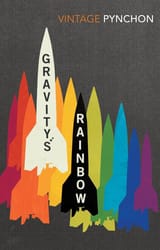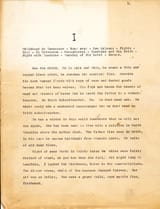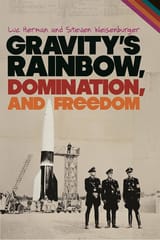Anonymous
9/3/2025, 8:45:07 PM
No.24694447
>>24694512
>>24694530
>>24695391
>>24695632
>>24695658
>>24695841
>>24695847
>>24695955
>>24695976
>>24696078
>>24696145
>>24696145
>>24696612
>>24696644
>>24699616
The central fallacy in how you read Gravity's Rainbow
Let's be clear: anyone who discusses GR in terms of 'plot,' 'themes of paranoia,' or 'character arcs' has fundamentally failed the test the book sets for you. You're trying to use a city map to navigate the open ocean.
The book is not a narrative; it's a cognitive payload delivery system. Its purpose is not to be understood in the conventional sense of assembling a coherent story. Its purpose is to simulate, at a neurological level, the experience of living within a totalizing, incomprehensible system of information—to induce the state of apophenia and intellectual vertigo that defines the post-war consciousness.
Pynchon bombards you with acronyms, equations, historical detritus, and obscene limericks not for you to meticulously decode and file away, but to overload your analytical faculties. He is forcing your brain to abandon its search for linear causality. The text itself is the Zone. It's an environment, not a story.
The book is a filter. Not for intelligence, but for a specific kind of intellectual vanity—the need to solve, to map, to declare mastery over a text. The moment you pull out a character chart or a plot summary, you have been successfully 'filtered'. You've chosen the map over the territory. The true reading of the book is the experience of being lost within it.
So, the question isn't "what does it mean?" The real question is: at what point during your reading did you abandon the pretense of analytical observation and simply surrender to the data stream? Or are you still LARPing as a literary critic, trying to connect dots that were designed to remain scattered?
The book is not a narrative; it's a cognitive payload delivery system. Its purpose is not to be understood in the conventional sense of assembling a coherent story. Its purpose is to simulate, at a neurological level, the experience of living within a totalizing, incomprehensible system of information—to induce the state of apophenia and intellectual vertigo that defines the post-war consciousness.
Pynchon bombards you with acronyms, equations, historical detritus, and obscene limericks not for you to meticulously decode and file away, but to overload your analytical faculties. He is forcing your brain to abandon its search for linear causality. The text itself is the Zone. It's an environment, not a story.
The book is a filter. Not for intelligence, but for a specific kind of intellectual vanity—the need to solve, to map, to declare mastery over a text. The moment you pull out a character chart or a plot summary, you have been successfully 'filtered'. You've chosen the map over the territory. The true reading of the book is the experience of being lost within it.
So, the question isn't "what does it mean?" The real question is: at what point during your reading did you abandon the pretense of analytical observation and simply surrender to the data stream? Or are you still LARPing as a literary critic, trying to connect dots that were designed to remain scattered?








